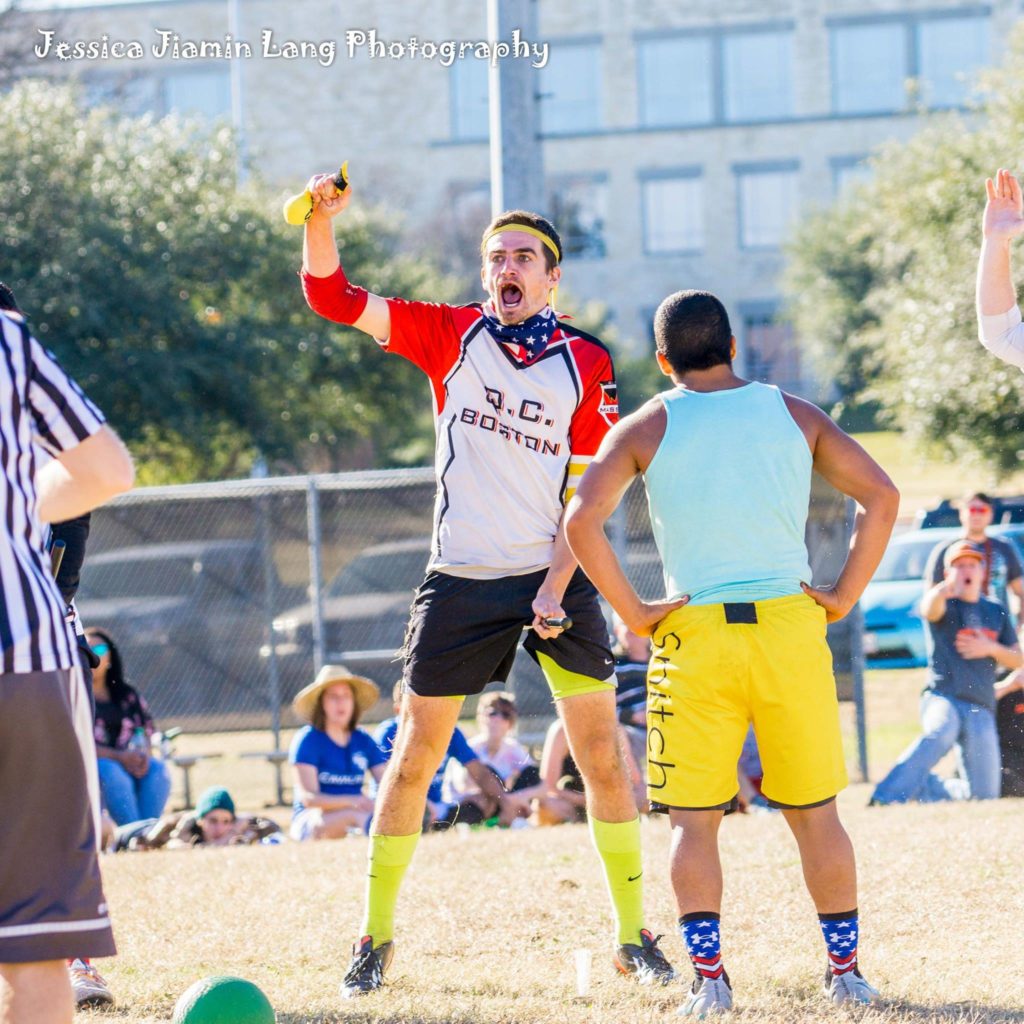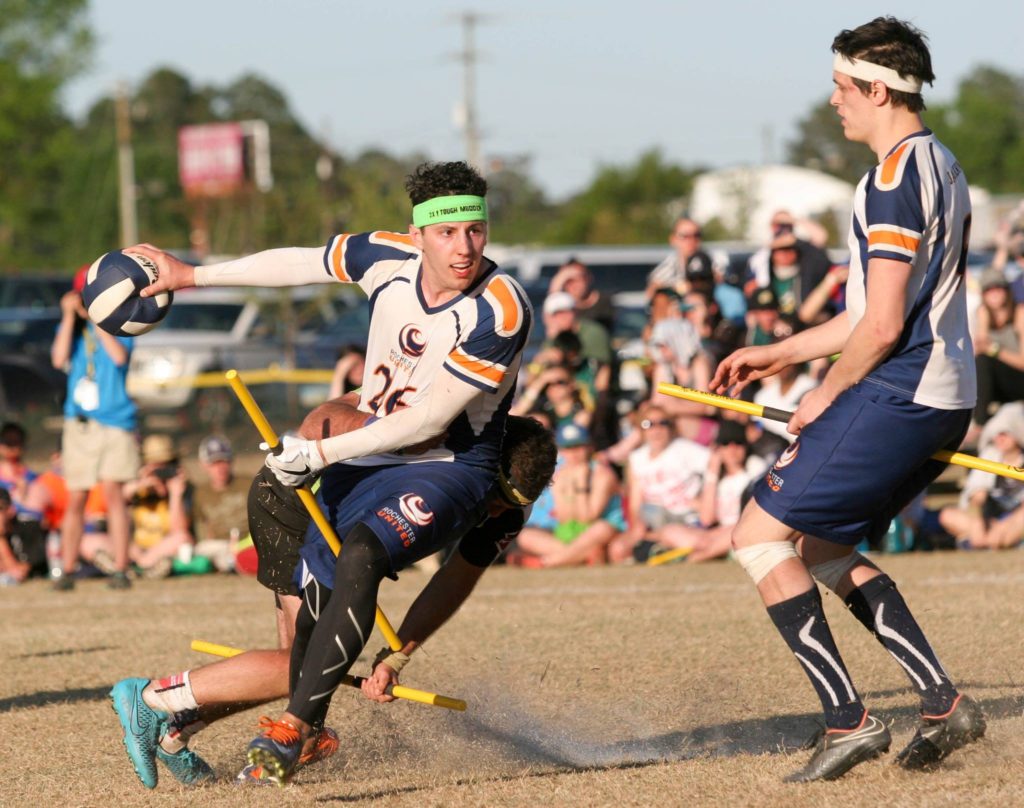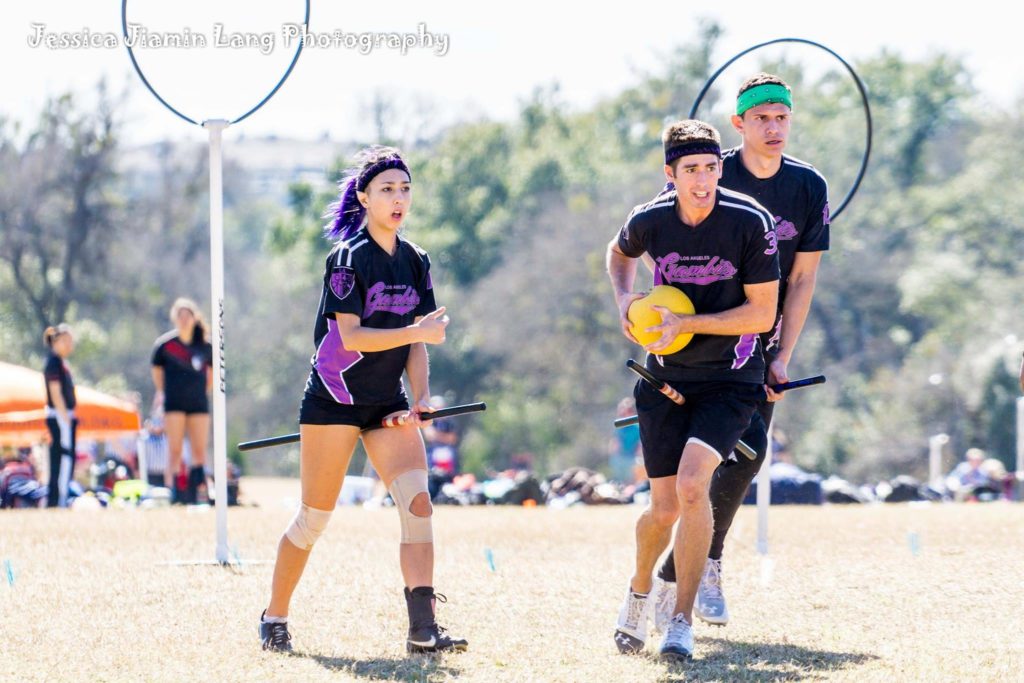Antwerp QC, Much of Belgian Core, Leaves Competitive Quidditch

Credit: Jessica Jiamin Lang
Welcome, everyone, to the 2016-17 USQ season: where the favorites are favorites not by hype, but by default.
For the past eight months, quidditch has been treated to a dynamic rivalry at its highest level. The Boston core, comprising the heart of Quidditch Club Boston and the Boston Night Riders, and the Austin core, made up of Lone Star Quidditch Club and Austin Outlaws players, broke from the pack and waged an epic battle for two different national titles. How dominant were they? Well, from the moment Jayke Archibald caught the snitch to beat Lone Star at the Bat City Invitational in January, neither core lost another game against any other team—a span of over 50 matches that still stands to this day. And while the Boston core went 4-0 in their head-to-head matchups—claiming both the USQ and MLQ titles—Lone Star wasn’t outscored in any of the four games and ended them with a quaffle point differential of +40.
Unfortunately for lovers of elite quidditch, that rivalry has been put firmly on hold for eight months.
Lone Star looks to be a shell of its former self in the 2016 USQ season, with retirements—including Drew Wasikowski and Sarah Holub—and transitions to MLQ-only play schedules—as Mollie Lensing and Kedzie Teller have announced their plan to be—ravaging the roster and piling up more and more each day. On top of that, the presence of Texas Cavalry, which shares a geographic area with Lone Star but was more successful in the recruitment of recent college graduates last season, makes replenishing Lone Star’s roster even more difficult.
Boston, meanwhile, appears to have taken the foot off the gas after an almost-perfect 16-month run. Along with losing some players to geographic distance and retirement, most notably David Fox and Kyle Jeon, the team appears to be unconcerned with furthering their potential dynasty, at least during the USQ season. With minimal recruitment effort and no plans to actually practice, it will be hard to count the defending champions as regional contenders, nevermind national contenders.
So, with those two teams out of the way, we get the Los Angeles Gambits and Rochester United as US Quidditch Cup 10 (Are we sure US Quidditch Cup X doesn’t sound cooler?) favorites. This is not simply because they’ve earned the title or improved upon previous form, but because no one else seems particularly interested enough or talented enough to go for it.
Don’t believe me? Let’s run through last season’s Elite Eight programs. We already touched on Boston and Lone Star, and you can throw the Lost Boys in that category as well, as their roster has more holes than Team USA’s gold medal-game defense. Ball State University lost both the 2015 and 2016 MLQ North Division MVPs, while Bowling Green State University lost over half of their US Quidditch Cup 9 roster. Boise State University announced a 16 player A-team roster and the discontinuance of their B-team earlier this week—a sign that their seniors may not have laid enough framework on their way out.

Credit: Matt Dwyer
Think a university team is going to break out of the pack to chase down the two community team thoroughbreds? Think again: Rochester United and the Gambits have a combined 42-4 record against against college teams last year, with three of those losses coming in overtime to teams who caught the snitch twice and the fourth occurring in September. These teams are at the top because they are holding onto the same talent from the past while adding recent graduates. Meanwhile, colleges are once again rebuilding after turning over their talent. There’s simply no contest.
What about other community teams being up for the task? New York City has finally accumulated enough graduated talent, but the split of said talent with the creation of the BosNYan BearSharks should keep both them and The Warriors out of national contention. District of Columbia Quidditch Club still lacks a game-changing beater, and while the team performed better as the Washington Admirals over the summer, beaters Jeremy Dehn and Mike Madonna are still on the University of Maryland’s team for the USQ season. Then there’s Darren Creary, who is nowhere to be found. Texas Cavalry ended last season incredibly flat and will need to improve massively to be in contention in April. The Great Lakes is once again starting anew on the community team front. Crimson Elite and Gulf Coast Gumbeaux just don’t have enough talent to make a run for a title—you can’t get there without at least one Team USA-caliber player—and the South, Midwest and Northwest managed exactly one Sweet-16 team combined at US Quidditch Cup 9.
To be fair to the Gambits and Rochester United, both teams are improving themselves for the coming season. The Gambits are adding Eric Dreggors and most likely Margo Aleman—two of the best seekers in the sport—shoring up a position that has been their downfall far too many times over the history of the program. We mentioned that the only college team wins last season against these teams came with double snitch grabs. Between those additions to the Gambits and the emergence of Cody Keefer as a seeker threat for Rochester, the window has closed that much further.
Furthermore, Rochester will be adding Lisle Coleman at beater, where she will be able to give a much needed breather to an overworked Sara Smacher.
But beyond that, and some depth additions on both sides, not too much is going to change. Rochester is going to continue to get by with the sparkling play of Shane Hurlbert, Jon Jackson and their two-male beater sets, while the Gambits will continue to rely on smart, efficient beating and Tony Rodriguez being one of the best quaffle players in the sport. The difference is this season, it’ll work.
Now, before you jump on me a month from now, I want to make a few things clear. Rochester will show up to a tournament in the fall with too few players, most likely with a lack of both Jon and Maria Jackson, and lose a game they have no business losing. The Gambits, likewise, will play a couple of West teams that have played them a million times closer than they should, and maybe even end up losing one or two due to a bad snitch.

Credit: Jessica Jiamin Lang
But none of that will matter. Come January, the Gambits will more or less host the Sunset Invitational, and, like Boston did a year ago at Bat City, will end the day as the nation’s top team. Rochester will either find a way out for Sunset, or continue to play a thousand East Coast tournaments until they are far more prepared than any college team can hope to be. And when all eyes fall on the US Quidditch Cup 10 finals field, as long as the bracket cooperates, they will be the two teams on the pitch.
This result will be in part because they deserve it and in part because they still have the fire to win a championship, the same fire that spurred the early Texas A&M University graduates to stay with the sport year after year and that held Boston together for just long enough a season ago. But it will also be in part simply because no one else wants it.
Welcome to the USQ season. Welcome to complacency.
Archives by Month:
- April 2025
- May 2023
- April 2023
- April 2022
- January 2021
- October 2020
- September 2020
- July 2020
- May 2020
- April 2020
- March 2020
- February 2020
- January 2020
- December 2019
- November 2019
- October 2019
- August 2019
- April 2019
- March 2019
- February 2019
- January 2019
- November 2018
- October 2018
- September 2018
- August 2018
- July 2018
- June 2018
- April 2018
- March 2018
- February 2018
- January 2018
- November 2017
- October 2017
- July 2017
- June 2017
- May 2017
- April 2017
- March 2017
- February 2017
- January 2017
- December 2016
- November 2016
- October 2016
- September 2016
- August 2016
- July 2016
- June 2016
- May 2016
- April 2016
- March 2016
- February 2016
- January 2016
- December 2015
- November 2015
- October 2015
- September 2015
- August 2015
- July 2015
- June 2015
- May 2015
- April 2015
- March 2015
- February 2015
- January 2015
- December 2014
- November 2014
- October 2014
- September 2014
- August 2014
- July 2014
- May 2014
- April 2014
- March 2014
- February 2014
- January 2014
- November 2013
- October 2013
- September 2013
- August 2013
- July 2013
- June 2013
- May 2013
- April 2013
- March 2013
- February 2013
- January 2013
- December 2012
- November 2012
- October 2012
Archives by Subject:
- Categories
- Awards
- College/Community Split
- Column
- Community Teams
- Countdown to Columbia
- DIY
- Drills
- Elo Rankings
- Fantasy Fantasy Tournaments
- Game & Tournament Reports
- General
- History Of
- International
- IQA World Cup
- Major League Quidditch
- March Madness
- Matches of the Decade
- Monday Water Cooler
- News
- Positional Strategy
- Press Release
- Profiles
- Quidditch Australia
- Rankings Wrap-Up
- Referees
- Rock Hill Roll Call
- Rules and Policy
- Statistic
- Strategy
- Team Management
- Team USA
- The Pitch
- The Quidditch Lens
- Top 10 College
- Top 10 Community
- Top 20
- Uncategorized
- US Quarantine Cup
- US Quidditch Cup
